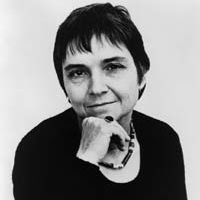The Afterwake by Adrienne Rich: Critical Analysis
The Afterwake by Adrienne Rich is a feminist poem. The poem presents a woman or a nurse who has nursed someone throughout the night and then become conscious of her own strenuous (tiresome) journey that would begin. She has a long way to go and many things to do.

Adrienne Rich (1929-2012)
But her purpose and aims are giving her some strength. This situation can also be symbolically interpreted as an allegory of the feminist movement of the late twentieth century. The after-wake is the age after women have woken up from the dark ages of male domination and self-sacrifice.
After nursing the nerves of another person-most probably a male – the woman has roused her own nerves. Trapped in feminine ethic of selflessness, the woman in this poem is a mid wife to men. The energy of this woman has been mobilized to meet the demands of her man: she has succeeded in soothing him by absorbing his anxiety and pain; he is asleep and she is alone, too tense and exhausted to sleep. She now has to go a long way to her own place; she is already very tired. A woman has many duties and burdens. The other person is asleep inside. She slumps heavily in “his” front parlor. He is safe inside, and she is out. The speaker compares herself with a midwife who has helped the mother of a safe birth but who has to go home in the morning with an exhausted body and mind. This image is very realistic and poignant. The midwife would have to go five miles away to her home, with the “birth yell” in her head, and all the work waiting here at home.
In the second part of the poem, the tone and subject itself has shifted. The speaker is a female with a companion and it's about starting the journey. It is still dark in the morning she has a load of unexciting “purpose” or aim on herself. Though she is tired, she moves under the morning star along with her friend. She feels that her load of purpose gradually drains out on the way.
The poem depicts a woman’s condition of life. At that simple level of interpretation, we can say that this is every woman’s story. It is a typical situation in which a woman who serves somebody as her own home and destination to reach after the work. The situation is painful. It also seems that this is a professional nurse. Nurses also sacrifice for others and sometimes realize how difficult it is to go on with many and troublesome responsibilities.
At a more general or symbolic level, this poem is about the modern awakening of female consciousness and the feminist movement. The title means the time after the beginning of the movement. Now women are conscious of how dark the night of history has been for them. This is the morning for the liberty and revolution, but it is still dark. The star may be a symbol of hope and ambition. But the houses are closed on the way: there is no help. This modern woman is astutely conscious of the vision she needs to carry along. But she can realize that this load of aims will have to decrease on the way. Maybe, some of the goals will be achieved on the way, and others will have to be compromised. She is determined to travel this road with a friend till the end of her life.
The first part of the poem may be said to be representing the woman’s plight in a typical picture of life. This was, and still is, the condition of woman in many parts of the world. The second part gives more hints about the symbolic level of meaning. Rich employs free verse, dialogue and interweaving of several voices. She evolves from a more tightly constructed traditional rhymed poetry to a more open, loose and flexible poetic line. Like a ‘modern’ poem, it is complex. Its images must be interpreted tactfully by the reader themselves. It is flexible in its meaning. The symbols are private and original. The diction is simple. The poem is basically dramatic in its expression. The situation is itself broadly a symbol. But the poem is also realistic on the surface itself.
Adrienne Rich has written her poetry for all time. While it grows out of the political conflicts and tensions of the feminist movement and the antiwar protests of the sixties and seventies, it speaks of universal issues of relationships between men and women and between women and women that will endure for generations to come.
Cite this Page!
Sharma, Kedar N. "The Afterwake by Adrienne Rich: Critical Analysis" BachelorandMaster, 19 Oct. 2013, bachelorandmaster.com/britishandamericanpoetry/the-afterwake.html.
